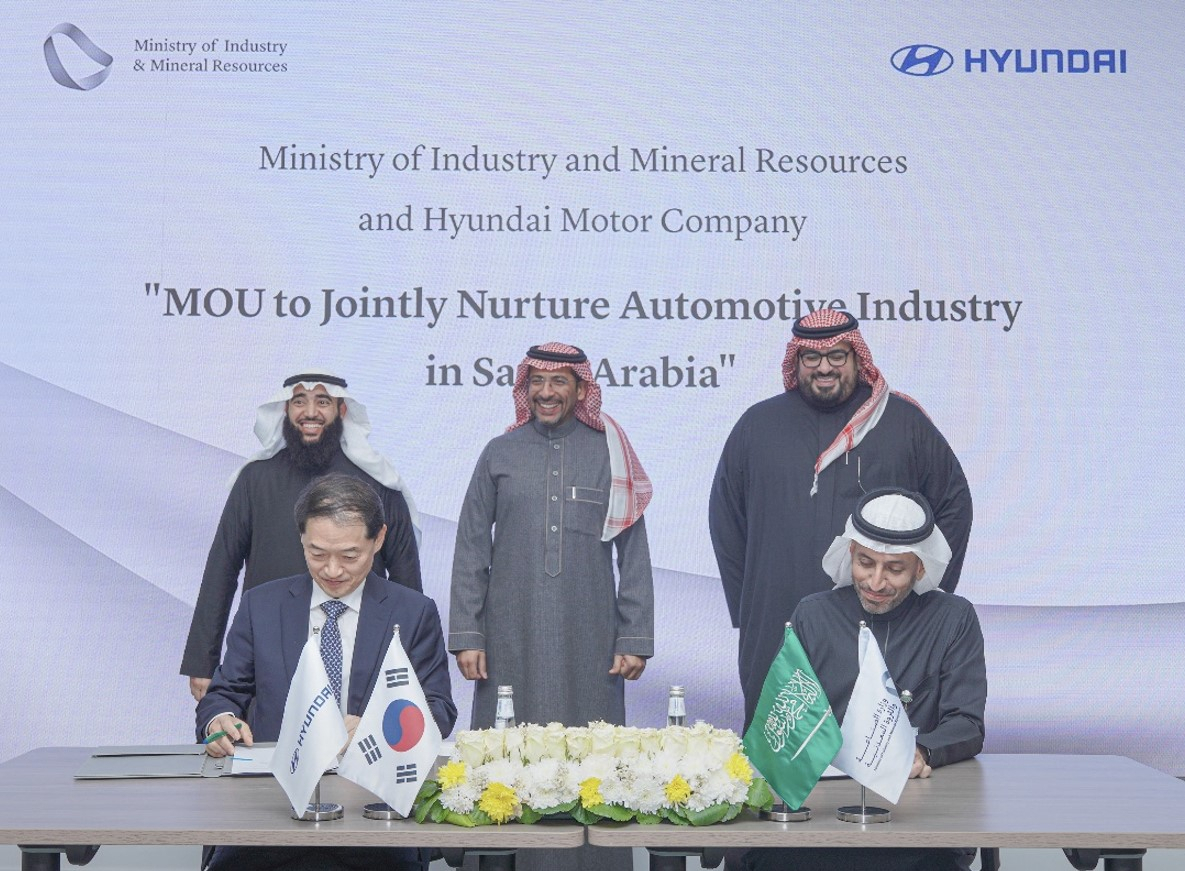 |
Hyundai Motor Group Executive Vice President Kim Seon-seob (front left) and Saudi Minister of Economy and Planning Faisal Al-Ibrahim (front right) sign a memorandum of understanding to enhance Saudi Arabia’s regional automotive industry. (Saudi Ministry of Industry and Mineral Resources’ Twitter) |
Hyundai Motor Group is considering setting up its first Middle East plant in Saudi Arabia, paving the way for it to secure footing in the region’s burgeoning automotive market.
The Saudi Ministry of Industry and Mineral Resources on Saturday announced in a tweet that the kingdom had inked a memorandum of understanding with the South Korean carmaker to advance joint cooperation for the auto industry in the region to achieve its national goal of developing local manufacturing capabilities.
Minister of Industry and Mineral Resources Bandar Al-khorayef and Hyundai Motor Group Executive Vice President Kim Seon-seob were among the attendees at the signing ceremony.
The memorandum stated that the two sides plan to build an auto assembly plant -- also known as a "completely-knocked down" plant, where parts of a product are delivered and assembled to manufacture the final product -- in Saudi Arabia. The plant will manufacture both electric vehicles and cars with internal combustion engines. No specific timelines or scales of the plant were disclosed.
“The memorandum signals sitting down at the same table to discuss future plans. Nothing has been decided in regard to the exact size and construction timing of Hyundai’s new assembly plant there,” a Hyundai Motor official said on condition of anonymity.
According to the memorandum, the cooperation agreement came as the two sides had mutual interest in exploring joint investment opportunities and projects that ensure safety and sustainability.
The deal is in line with the goals of Saudi Vision 2030, which aims to diversify the kingdom’s economic foundation from heavily depending on oil sales. In the case of the automobile industry, Saudi Arabia aims to manufacture 300,000 vehicles at domestic factories by 2030.
With the first manufacturing plant in the Middle East, Hyundai Motor will have stronger grounds to expand its market share in Saudi Arabia.
Since allowing women to drive in 2017, car sales have been growing there, creating a market with almost 600,000 sales. Currently, Japan’s Toyota is the largest carmaker with a 28.4 percent market share in the country, followed by Hyundai at 16.6 percent.
Hyundai is especially pinning high hopes on the kingdom’s electric vehicle push. As Saudi Arabia set out the objective of having at least 30 percent of all cars run electric in its capital city of Riyadh by 2030, the agreement could extend to cooperating in EV and hydrogen technologies, including hefty government incentives for new car purchases.
"(The agreement) is no surprise. Saudi has emphasized the role of Hyundai Motor in what Korean companies can do with its mobility technology in regard to the Neom city project," Kim Pil-soo, an automotive engineering professor at Daelim University, told The Korea Herald.
Saudi Arabia's $500 billion Neom project plans to develop a futuristic smart city running on 100 percent renewable sources in a desert area in the kingdom’s northern Tabuk province.
"Saudi is very interested in Hyundai's eco-friendly mobility technology, such as EVs and hydrogen-fueled vehicles. So Hyundai building an assembly plant for EVs in Saudi is the first step along the process," he said. "It makes total sense."
The signing came about a month and a half after Crown Prince and Prime Minister Mohammed bin Salman visited South Korea in mid-November. During the two-day trip, the crown prince met with several business tycoons, including Hyundai Motor Group Executive Chair Chung Euisun.
Hyundai Motor Group's two carmakers, Hyundai Motor Company and Kia, combined operate overseas manufacturing plants in Brazil, China, the Czech Republic, India, Mexico, Russia, Slovakia, Turkey and the US.






![[Today’s K-pop] Blackpink’s Jennie, Lisa invited to Coachella as solo acts](http://res.heraldm.com/phpwas/restmb_idxmake.php?idx=644&simg=/content/image/2024/11/21/20241121050099_0.jpg)
